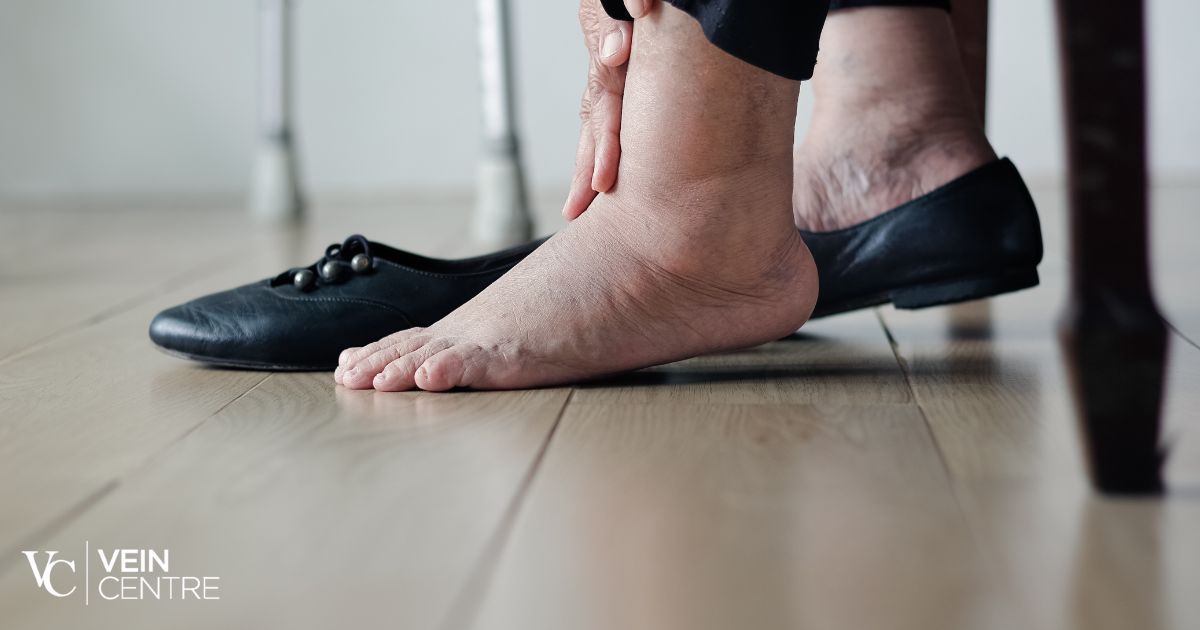Are your legs swollen and even painful? Swelling can be an indicator of vein disease progressing in your body. Vein disease can become deadly if left to progress without intervention. If you are experience swollen legs, learning about vein disease could save your life and improve the quality of the life you live. Read more to learn about swollen legs from the Vein Centre in Tennessee and what you can do to reverse or stop vascular disease progression.
What causes swollen legs?
If you are experiencing a chronic swelling in the legs, ankles, or feet, vein disease might be to blame. Venous edema is the term for this swelling when vein issues cause it. Over 90% of swollen legs are due to vein health, so chances are, if you have been experiencing this, the cause is venous insufficiency.
Swelling occurs because blood flow through the vessels is impaired. Fluid is then able to accumulate with no release, and this often happens in the legs. Signs of edema in the lower limbs:
- Swelling of one or both limbs that can come and go
- The increased size is not due to inflammation
- Is sometimes painful
- Swelling and/or pain worsens with prolonged standing
- Symptoms improve with raised legs
- Over time, the skin may thicken in the area
- The limb may begin to feel hot when standing
- Legs may feel heavy, and this feeling can increase when standing or moving
When edema is from vascular disease, you will often find spider veins, darkened skin, eczema, and ulcers in the surrounding area. Lymphedema may also develop when the lymphatic system can’t drain properly.
Reasons for Vein and Leg Swelling
Your veins may swell for several reasons. Some reasons are not vein related, like Lyme disease, hereditary issues, heart vent failure, kidney disease, and gastrointestinal disease.
Chronic Venous Insufficiency
When blood is unable to flow back to the heart, it is called chronic venous insufficiency. This complication happens when your veins’ valves don’t function properly or close the entire way. With valve malfunction, blood can flow backward and then pool in the lowest area, generally your legs. Venous insufficiency can cause pain, swelling, cramps, skin changes, varicose veins, and leg ulcers.
You are at higher risk for this complication if you:
- Have a history of vascular health issues
- Are overweight
- Are pregnant
- Have had previous blood clots
- Don’t exercise
- Smoke
- Have high blood pressure
Deep Vein Thrombosis
Deep vein thrombosis is another vein dysfunction that can create swollen legs. Also known as DVT, deep vein thrombosis happens when a blood clot forms in veins deep in your body. DVT has the potential to become a severe vein condition if blood clots break loose. If a blood clot breaks free and travels to the lungs, a pulmonary embolism can occur. While pain and swelling are symptoms, sometimes there are none.
Look for these signs of DVT:
- Swelling in only one leg, this will be the leg with the blood clot
- Pain in the affected leg that feels like cramping or soreness
- Your skin turning red or discolored
- The affected leg feeling warm
Varicose Veins
Varicose veins are veins that have swollen and become damaged. This swelling doesn’t stop at your veins, though. Trapped fluid can leak out and into the surrounding tissue. When this happens, your skin may feel tight or hot. Your legs and feet can swell and clear our yellowish fluid might leak out in the most severe cases.
Varicose veins can be easy to spot:
- Large blue or purple veins will be visible just under the skin
- The veins twist and bulge
- Your legs feel achy or heavy
- Muscle cramping in the area
- Itchy skin in the area
Complications of Leg Swelling from Vein Disease
As your legs swell, you can develop complications from mild to severe. Some are uncomfortable, like pain, heaviness in the legs, muscle cramping, and skin color and texture changes. One complication from vascular disease is ulcers in the legs and ankles.
When the leg swells, pressure increases on blood vessels until they inevitably burst. These broken capillaries often turn brown and are painful to touch. If left untreated, the tissue in the area can become inflamed and damaged. This tissue damage can progressively get worse and turn into non-healing wounds known as ulcers. These open sores often don’t heal and become infected. Quick treatment of an infected ulcer is imperative as the infection can spread throughout the body and into deep tissue, bones, joints, and your blood.
Another complication is Lymphedema. When Lymphedema occurs from chronically swollen legs, the lymphatic system is unable to circulate fluid through the body. This symptom weakens your immune system function and increases the risk of infection in the swollen area.
Treatment for Leg Swelling
When leg swelling is due to a vascular issue, there are a few at-home changes you can make.
Tips to reduce swollen leg problems:
- Elevate your legs. This helps by letting gravity do some of the work to get fluid back to other areas of the body.
- Wear compression stockings. Compression stockings aid in pushing blood and fluid back up out of the leg to relieve pain. Your vascular doctor can even prescribe medical-grade garments.
- Lose weight. High weight contributes to vascular strain.
- Exercise. When you move around, you help pump blood and fluids around your body as your muscles contract.
When at-home treatments don’t work, a surgical route might be the best treatment to relieve your swollen legs. If varicose veins are the root cause, endovenous laser treatment (EVLT) is a great solution. EVLT is a procedure that uses heat created by a laser to close off a varicose vein. Once the vein is closed off, blood flow will cease in that weak area.
Ultrasound-Guided Sclerotherapy (USGS) is another treatment your vascular surgeon provides for leg swelling. Using ultrasound, a sclerosant chemical is injected into the correct vein to close it off. This damaged vein is reabsorbed into the body, and blood will begin to flow through other healthy veins.
If you are experiencing leg swelling and pain, you may have vascular disease. Give the Vein Centre in Tennessee a call at 615.269.9007 and schedule an appointment with our board-certified vascular surgeons in Belle Meade (Nashville), Franklin (Cool Springs/Brentwood), and Mt. Juliet, TN.



